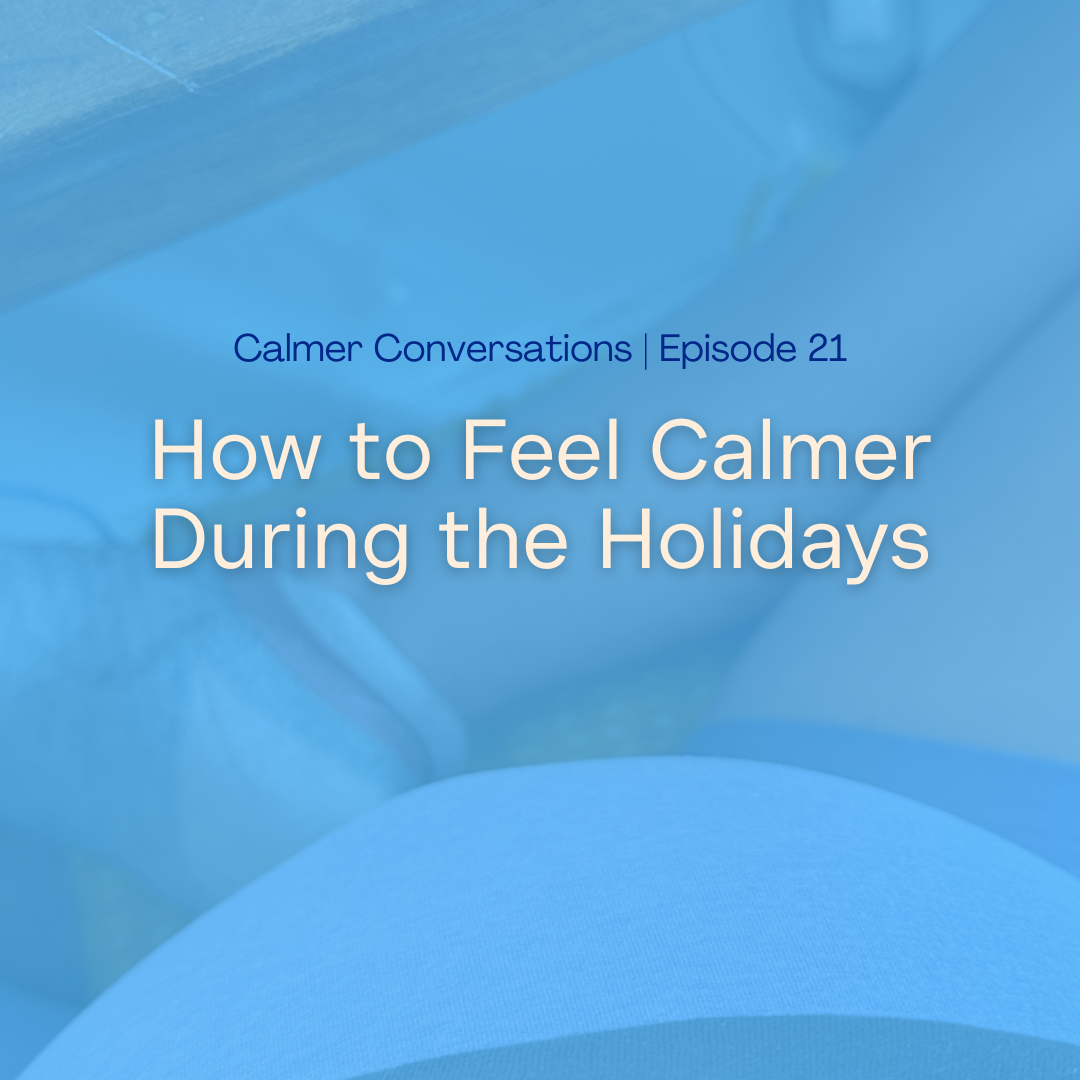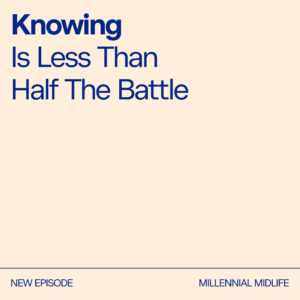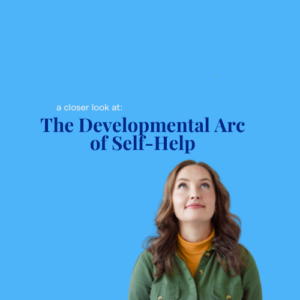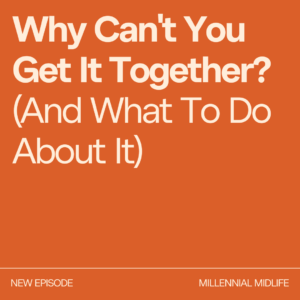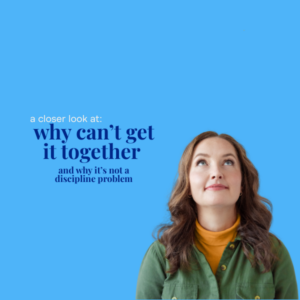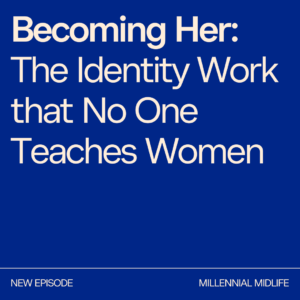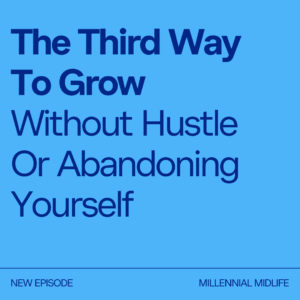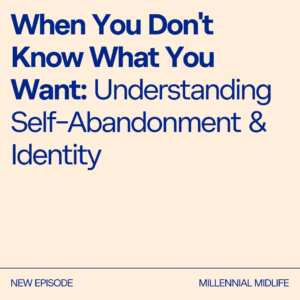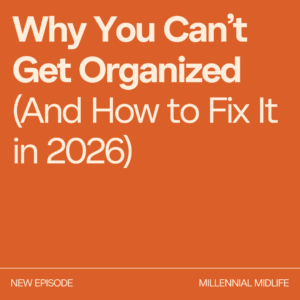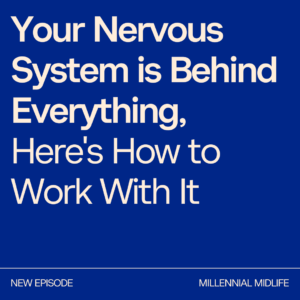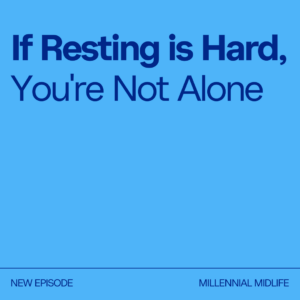Cecelia Baum Mandryk (00:05.314)
Hey and welcome to Calmer Conversations. This is episode 21 and I believe today, the day that this will air, is Thanksgiving in the US. I know that Canada has their Thanksgiving earlier and that a lot of people don’t have Thanksgiving in general. But this is also the opening of the holiday season for a lot of people. moving into December, we’re moving into holiday parties, we’re moving into kind of the intensity of this.
of the season. So whether you’re doing something today to celebrate Thanksgiving, maybe with family, whether you’re just aware of what’s happening or on the horizon for the holidays, today we’re going to talk about going to events. So going to family events, probably specifically, but you can also just kind of put this in the category of really any social event. So maybe that’s a work holiday party or friend groups or things like that.
I’m going to talk about how you can approach it in a way that brings calm into your brain, that helps you regulate your nervous system, that helps you maybe have a different experience than perhaps what you have had in the past. So if you’re a person, you have holidays coming up that you are going to be celebrating, this might be helpful for you. If you are a human being who goes to events during different times of the year and are going to any holiday events,
during this period, this will probably also be helpful for you. So you can kind of change the wording I’m using around Thanksgiving or Christmas or Hanukkah or whatever it is that you celebrate or New Year’s. And you can kind of insert any event in here. So let’s get started. Okay, so oftentimes when we have something on the horizon, and this is very natural, all of our brains do this, is we look
to how something has gone in the past to determine how it’s going to go this time, right? So for instance, if you are listening to this and you’re driving to a family Thanksgiving event, you probably have been to this one before. You might not, right? Maybe you’re going to a new partner’s Thanksgiving or you’re having a friendsgiving or you’re doing something totally different, but chances are you’ve been to this one before.
Cecelia Baum Mandryk (02:20.708)
and your brain will very naturally tell you that whatever has happened in the past is destined to repeat itself now. So that you’re simply going to have a very similar experience. And I will say that most people will come into the experience with the same conditioning, with the same nervous system states. And so very often these events can feel like Groundhog Day, right? You know, the gravy’s late and so instead of having
the dinner at 3 p.m. you’re having it at 4 p.m. and then like the whatever is cold and so and so does this and then uncle whatever drinks too much and says these things and it just kind of feels all very predictable. So we can sometimes go into humans, you, me, can go into kind of a doom spiral or a dreading these kinds of events. Like I don’t want to go to them even though they might be full of people that we love and want to spend time with.
And so I’m not going to tell you that you have to go to family events. You can do whatever you want to, and you can kind of evaluate whether you’d like to go. But if you are going to go, you might want to have a different experience. And again, this could be friend events. This could be work events. This could be kind of anything that’s coming up through the holiday season or during the rest of the year when you have things that are things that maybe you feel obligated to go to or want to go to, but have some story about it that
that you don’t really love that kind of creates dread, that kind of creates this feeling of like, like, I don’t want to do this, or this is going to be bad, or it’s going to be stressful. So the first thing I want you to do is just check in with why you might want to go to this, right? So if you just kind of, if it was blank slate, you didn’t know what was going to happen. it was just, if you just had a choice, why are you choosing to go? And this is really important because
you can start to recognize the reasons why you are going to something, or you can recognize that you have a choice not to go if you don’t wanna go. Right, so know that you always have a choice, and sometimes it doesn’t feel like we have a choice with family stuff or holiday stuff or obligations, but you do generally always have a choice. Most of us are not forced to go to these events. We might feel obligated, but that’s something that’s happening in your brain that is not a force from an external,
Cecelia Baum Mandryk (04:47.934)
an external source that’s making you actually go to this. So first checking in, saying why do I want to go to this event? What’s important about this event to me? And it might be I really want to see the family or I really like it when we all get together. I really love this holiday. I really love cranberry sauce, which is one of my favorite parts of Thanksgiving.
So thinking about that and taking the time. And as you listen to this episode, you might want to pause at different points and either write things down or speak them out loud to yourself or record them in some way so that you can actually go through this, right?
And then instead of your brain going into this spiral, the dread, or when your brain goes into the dread, I want you to pause and we’re going to try something different. So I want you now, now you know why you want to go to this event or why you might choose to go to this event, even if you might not be 100 % looking forward to it. And I want you to ask yourself, if I got a choice,
in how I got to leading up to this event, during the event, and after the event, what would it be? So there’s three different time periods, but you might ask yourself for those three different time periods. So for instance, you might generally feel dread leading up to the event or anxiety or overwhelm. And then during the event, you might feel stressed. And then after the event, you might feel a lot of regret.
or something like that, right? And so instead of, that’s where your brain will naturally go, that’s the autopilot, this is your brain kind of saying this is how it’s going to unfold for me. Instead, I want you to ask yourself, how do I want this to go? So how do want it to feel for me? So for instance, leading up to it, I might either wanna feel neutral, or I might wanna feel positive expectation around it, right? Like, I’m really excited to see my family.
Cecelia Baum Mandryk (06:47.392)
or I’m excited for the cranberry sauce, or I’m excited to go on our after dinner walk or watch the football game that’s on or whatever it is or see the parade. So noticing, how do I wanna feel leading up to this event? And I know that this is a little late if you’re actually on the way to Thanksgiving, but if you’re on the way to Thanksgiving right now, or you’re thinking about future events that you’re going to, this is helpful. And then asking, how do I wanna feel at the event during the event? Right, and again, this might be,
You might not, sometimes it’s, we wanna go to the extreme positive. A lot of times it’s not accessible for us. So you wanna pick a feeling that maybe feels accessible, but is slightly better than what you generally feel. So if you usually feel stressed during the event, you might say, I’d really love to feel more neutral. I’d really love to feel more grounded. I’d really like to feel less activated. So less frustrated or angry or disappointed or just kind of like enraged or something like that, right?
So I’d like to feel this way during the event. And then whenever you leave, whether that’s later today or tomorrow or whenever, how do I want to feel about it? What’s the story I want to tell about
Cecelia Baum Mandryk (08:03.746)
And this is really powerful because this is starting to prepave how the event is gonna go in your brain. When left on autopilot, your brain again is going to look to past events and how you felt, and it’s going to preferentially recreate those because that’s its frame of reference and that’s what your reticular activating system is kind of going for. But you actually have more choice in how this event goes.
And I want to let me explain that because there’s a really great chance that everybody else who goes to this event with you is going to be in the exact same place they were last year. Right. Well, humans have an unbelievable capacity for change in our brains and nervous systems are incredibly plastic and workable. Generally, there’s not a lot of change that happens. And so if Uncle so and so tends to drink too much and say whatever things
there’s a good chance it’s going to happen again. If the gravy’s been late for the last 10 years or 20 years, there’s a pretty good chance it’s going to happen again. Right, we don’t know that for sure, but the world, the circumstances of this party, if you’ve been to it before, are very likely going to be similar.
but you have a choice in how you show up to this event. And how you show up to this event will impact how you experience the event, even if everybody else is the same. And this is like such a crucial point, and I probably should have opened the episode with this, but that your experience of the event is more related to your own thoughts and your nervous system state.
than to what happens around you. So it’s really easy for us to say, well, I can only have a good time if everyone behaves, if uncle so-and-so isn’t there, or if he’s stopped drinking, or if the gravy’s on time, or if like this happens or that happens, then I will feel safe and have a good time. I need everybody else to conform around me. And this gets into boundaries, which, you know, will be another episode. But so we tell ourselves that everything around us needs to go a certain way.
Cecelia Baum Mandryk (10:19.936)
and then we will have a certain experience of the event. But in truth, even if everything else changed, if you were still having thoughts that this is stressful and anxiety inducing and I don’t wanna be here and I’m dreading this, your brain would still look for the things that make it anxiety inducing, that make it stressful, that make it fill you with dread, and you would still have a very similar experience, even with pretty different circumstances.
So what we’re doing here is we’re saying the circumstances will likely be the same. They might not be, right? They might be totally different. But you’re going to change your own experience of the circumstances by working with your brain and your nervous system. And so your experience of what happens can be different simply by shifting how you feel and how you think and what you’re looking for. So when I asked you how do you want to feel, if you want to feel ease or if you want to feel
relaxed or if you want to feel pretty neutral about the event, even naming that is powerful because it’s setting an intention in your brain. It’s pointing your brain to the possibility, parts of your brain, that this could be an event with ease, right? And so if I’m looking for ease overlooking for stress, that’s what I will start to see more of. When you have this, when you’ve made this decision, you set this intention that I want to feel this way,
What you can start to do is when your brain starts to go to the other place, it starts to feel stressed or it starts to feel overwhelmed or anxious, you can pause, you can take a slow breath, preferentially, usually in and out through your nose, you can. If you can get yourself to that place, you can notice what’s happening in your body, remind yourself you’re safe, and ask if I had a choice right now, how would I wanna feel? If I had a say,
and how I was processing this event or how I was experiencing it, how would I like to feel. And because you’ve already thought about this ahead of time, when you weren’t in the middle of it, you probably will very quickly have an answer, which is maybe neutral or relaxed or I’m having fun. I’m enjoying the event in a way that I didn’t think that I
Cecelia Baum Mandryk (12:30.962)
related to this, you might want to ask yourself ahead of time, what signs will my body and brain give me that I’m going down the path of past events? So for instance, you might say, I know that at past events, I generally like roll my eyes and huff a lot and, and like drink too much wine.
Right, and so I know that if I’m like already reaching for my second or third glass of wine that maybe this is an indication that I’m going down the path that I have been down before and then I might want to pause. And again, knowing these signals ahead of time or asking yourself about these signals ahead of time is really powerful because then you start to be on to your own way of being so that you can shift it and change it.
And you can then ask, how could I take responsibility for my own emotions in that moment? Once I notice that I’m going down this path, or even when I’m just there, how can I start to be responsible for my own thoughts and feelings? How can I show up in a way that creates safety for me, that tells me a story that helps me enjoy this party or this event, helps me have the event that I want to, the experience that I want to? And again, knowing you can have this experience,
almost in spite of everything else that happens around you. And I’ve, I mean, I’ve done this a lot and I’ve also been with other people, you know, had clients who’ve worked through this kind of thing. So knowing that it’s possible to have a very similar event kind of go on, but have a very different experience of it, asking yourself, how can I take responsibility for my own actions and my own emotional state is really powerful.
And then also asking yourself, can I care for me? So how can I set myself up for success? And that might be knowing that I’m going to leave at a certain time or when a certain thing happens. Or it might mean that if I am feeling overwhelmed, I step outside and I go for a walk. Or I set a timer on my phone and I’m outside for five minutes and I just take a few breaths. Or I disappear to the bathroom or go up, go into another room and give myself a little bit of time.
Cecelia Baum Mandryk (14:53.78)
And I use maybe some tools that I have that maybe you’ve learned from me or from somebody else like tapping or breathing or something like that. And I allow myself the chance to come back to regulation.
And if that all sounds kind of like wild to you, a huge portion of what I’m talking about today is available in the Nervous System course, which you can still get and watch the replays of, where you go through how to become an expert in your nervous system and how to work with your nervous system to find regulation.
Cecelia Baum Mandryk (15:29.43)
And then the other side of this is your thoughts, and this is where coaching comes in, right? So understanding these are my thoughts about what’s happening. This is the story I’m telling myself. And if I could start to tell a different story, then I could start to have a different emotional experience and nervous system experience of this day, of this event.
So again, there’s a fair bit of prep work in this, right? So you’re asking yourself, how do I want this to go? You’re asking, how will I know when it’s, you can ask how will I know when it’s going well too, right? What signals will my brain give? Like maybe I’m not reaching for the wine and that’s pretty cool. Or I’m talking to people when normally I don’t talk to them. So how will I know that it’s going well? How will I know that things have kind of gone off track a little bit, that I’m not?
on the path that I want to be on for this event? And how can I support myself in getting back there?
And there’s no right answer to any of this. But knowing that you actually have some say in how these events go for you, you can’t control the other people. I know that it’s tempting to think that that’s possible, but you won’t be able to control everyone who’s there. And so if you want to have a different experience of holiday events this season, the most powerful route to go is to start to work with yourself.
And again, you can DIY this, but if you just want like a quick injection of change, really think about coming to the club or coming to taking the nervous system course, because those are two of the best ways to start to understand what is happening in your brain and body so that you can shift and have a different experience. Obviously, you can listen to episodes here and follow me on Instagram and things like that, too, to get more tips. But just know that if you really want to make changes quickly, then that’s perhaps the way to do it.
Cecelia Baum Mandryk (17:22.166)
So I want you to walk away from this knowing that even if everybody else is the exact same at the parties you go to, at the events you go to, that you can have a different experience of them and that having a different experience of them takes a little bit of consciousness and intention and working with your brain and nervous system to shift things. And I just want to wrap this up by saying cognitively knowing what’s happening between the different
members of your family or friend group or whatever is not the same as creating nervous system safety and changing your thought patterns. And so while if maybe you’ve gone to a lot of therapy and you have a lot of names for the behavior that people have, often that can also just bring us more into shame or frustration because that knowledge isn’t what you need to make shifts and changes and feel differently in the event. So I’m talking about something different.
We’re not labeling the people around you. We’re not kind of blaming them for how you feel. What we’re doing is we’re saying, okay, they’re going to be them. They’re going to have their things going on and I can know about them or not know about them. What I’m going to do is work with my own nervous system and brain so that I can feel differently during this event. Okay, so going into the holiday season, hopefully this is helpful or any event, as I said at the beginning, like this doesn’t have to just be for the holidays. So going into any event really. But Thanksgiving is today. So if you’re listening to this in the morning,
know that you actually have choice in how today goes for you or how this weekend goes for you. And you can start to work with that now in this moment and knowing that there are probably more events coming up for you over the coming month or months. And that if you start to make changes today that you will start to feel, you’ll start to experience things very differently. And I’m just gonna maybe end this with
Somebody who joined the club when I’m recording this in October and somebody who joined the club pretty recently got, we had a session, we had a learning session on boundaries and a learning session on dealing with other people’s emotions. And they took those two lessons, got coaching one time and then spent a weekend with their family and had a radically different experience of that.
Cecelia Baum Mandryk (19:43.874)
where they normally would have grabbed a lot of wine and kind of buffered and scrawled a lot and expected things from the people around them and been really disappointed and frustrated with them. Instead, they felt really grounded in themselves. They felt like they were able to show up differently. And they left the weekend actually having a pretty good time and having, again, a very different experience with their family than they have had in the past.
Just from a little little tweaking and a little bit of shifting nervous system and a little bit more awareness and implementation so You don’t have to make huge changes to feel differently during these events And if you’re ready to start making them check out the show notes And really honestly if you just want to feel differently during this event grab the $29 mini course on shifting your feelings Go straight to the five minute
processing your feelings part and you will have a radically different experience of today. So if you just need to feel better today, if you just need like a quick fix, grab that. That will also be in the show notes and help yourself feel better in the event today knowing that you might not have done all this work ahead of time. Okay, thanks so much for being here. I will see you next time.

